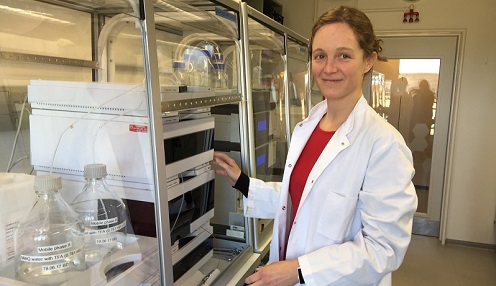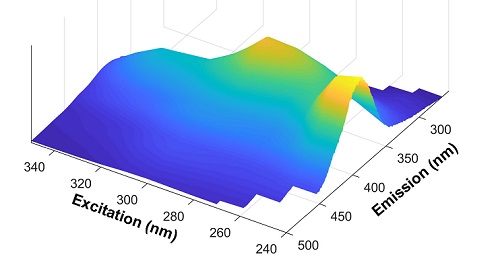New project aims to improve the quality of our food
Food scientists will ensure that industrial food processing does not affect our health by developing better methods for characterising changes in the structure of food proteins. The goal is to improve food quality. The idea behind the project is so innovative that Associate Professor Marianne Nissen Lund from the Department of Food Science and Biomedical Sciences at the University of Copenhagen has received a Sapere Aude grant for it from the Independent Research Fund Denmark.

Associate Professor Marianne Nissen Lund in the laboratory at the Department of Food Science (FOOD) at the University of Copenhagen. Picture Lene Hundborg Koss
Researchers now know that food proteins undergo many changes during industrial processing, including, for example, drying and pasteurisation. However, they do not know enough about the underlying mechanisms for these changes, which may be important for both the quality of the food and human health. A new research project at the Department of Food Science (FOOD) at University of Copenhagen will now change this.
“The changes in the proteins affect the quality of food by altering, for example, taste, colour, odour and texture. They can be both positive and negative changes. Some of the changes can result in a loss of important amino acids and thus lead to a reduction in the nutritional value of the food, explains Associate Professor Marianne Nissen Lund, who is among this year’s recipients of a prestigious Sapere Aude grant from the Independent Research Fund Denmark.
The new methods will also make it easier to investigate what food processing means for our health.
“There is a lack of knowledge about how industrial food processing and storage affects human health and in order to figure this out, we need to determine how we can map the changes taking place with the proteins on the molecular level,” says Marianne Nissen Lund.
The background for the new research project is the discovery that changes in food proteins during industrial processing can be studied by online monitoring.

Fluorescence spectrum of milk. Picture: Associate Professor Åsmund Rinnan, Department of Food Science at the University of Copenhagen.
“We have discovered that, using advanced spectroscopic methods and multivariate analysis, we can follow the chemical reactions taking place with the proteins during processing and storage. We can measure directly in the food and get information about several types of chemical reactions at the same time and we can describe the reactions using multivariate data analysis, which we have great expertise in at the Department of Food Science,” says Marianne Nissen Lund.
Revolutionary potential
The methods have the potential to revolutionise the way the industry studies food quality, because they can be used directly on food and thus are much easier and faster to use than the methods currently being used.
Today, you have to process the sample first, i.e. you have to extract the proteins and break the sample down to the individual amino acids. The amino acid moieties must then be separated in order to select the part you want to accurately analyse. The various amino acid moieties can contain many different types of modifications and different analytical methods must be used to analyse all of the different types. All of these steps result in the loss of information.
“It is also a time-consuming process of processing the sample material, while advanced spectroscopy can be carried out directly in the food and without processing the sample,” says Marianne Nissen Lund.
The researchers will begin by examining proteins in milk as milk proteins are very well characterised and well described and are very important for, for example, the quality of infant formula, but the methods are broadly applicable and can be expanded to a wide range of foods.
Related News
Contact
Associate Professor Marianne Nissen Lund, Ins (FOOD), University of Copenhagen, mnl@food.ku.dk
Or
Communications Officer at the Department of Food Science, University of Copenhagen, Lene Hundborg Koss, lene.h.koss@food.ku.dk
Background
The new research project is called INSITUQUANT, which stands for ”In situ quantification of protein modifications in foods”.
INSITUQUANT will start on 1 January 2018 and will run for four years.
It is funded through a Sapere Aude research leader grant from the Independent Research Fund Denmark to Associate Professor Marianne Nissen Lund at the Department of Food Science (FOOD) and Biomedical Sciences (BMI) at the University of Copenhagen. The grant is for DKK 5.9 million.
Multivariate data analysis:
Multivariate data analysis (also called chemometrics) is a mathematical method for extracting accurate information from large amounts of data. The method makes it possible to find relationships in complex data.
Collaborators:
Professor Joseph R. Lakowicz, University of Maryland, USA
Associate Professor Åsmund Rinnan, Department of Food Science, University of Copenhagen
